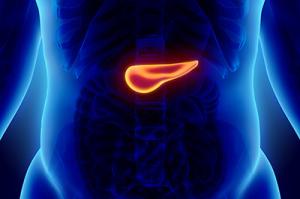
The Pancreatic Cancer Detection Consortium (PCDC) develops and tests new molecular and imaging biomarkers to detect early stage pancreatic ductal adenocarcinoma (PDAC) and its precursor lesions. These biomarkers would be used to identify individuals who are at high risk of developing PDAC and are candidates for early intervention.
On This Page
- All Heading 2s will automatically be pulled in to this list.
- Do not edit the content on this template.
The Recalcitrant Cancer Research Act of 2012 called on the National Cancer Institute (NCI) to develop scientific frameworks for research on recalcitrant cancers that have a 5-year relative survival rate of less than 20% and are estimated to cause the death of at least 30,000 individuals in the United States per year.
About PCDC
Pancreatic cancer is a recalcitrant cancer with a 5-year relative survival rate of less than 13% and resulting in nearly 52,000 deaths each year (Source: SEER Stat Fact Sheets: Pancreatic Cancer). NCI’s 2014 Scientific Framework for Pancreatic Ductal Adenocarcinoma identified four research priorities. These priorities were in part based on the recommendations of an expert panel of extramural scientists convened by the NCI in October 2012. One of the specific initiatives recommended by this panel was "evaluating longitudinal screening protocols concomitant with development of new molecular and imaging biomarkers for patients at high risk for PDAC (because of genetic factors or the presence of mucinous pancreatic cysts) who could be candidates for early surgical intervention."
Objectives of the Consortium
The main objective of the consortium is to develop and test new molecular and imaging biomarkers to improve the detection of early stage pancreatic ductal adenocarcinoma (PDAC) and its precursor lesions and identify individuals who are at high risk of developing PDAC and are candidates for early intervention.
The scope of the studies include, but are not limited to:
- Development of more accurate and sensitive imaging methods to detect early stage PDAC and PanIN-3s that could be used to select patients for surgical intervention (imaging modalities can be anatomical, functional, or molecular);
- Development and validation of biomarkers to detect early stage PDAC and precursor lesions that could be used to select patients for surgical intervention;
- Development and integration of imaging approaches and multiplexed biomarker panels;
- Development of imageable biomarkers yielding 3D localization of PDAC and high-grade precursor lesions;
- Evaluation of longitudinal screening protocols using patients at high risk of developing pancreatic cancer;
- Evaluation of longitudinal screening protocols of patients with resected PDAC with subsequent follow-ups using imagining modalities;
- Longitudinal collection of samples and images from patients with pancreatic cysts to determine those lesions that are likely to progress to adenocarcinoma within a defined period (e.g., 3 years), and determination of cysts with high malignant potential that are resectable;
- Development of novel methods to obtain and interrogate pancreatic tissues containing preneoplastic lesions.
The participating institutions include U01 grants to Research Units (PAR-21-334) and a U24 grant to the Management and Data Coordination Unit (PAR-21-335).
The Alliance of Pancreatic Cancer Consortia for Biomarkers for Early Detection Workshop
In order to bring together investigators funded through NCI-supported programs on pancreatic cancer detection and stakeholders that are supporting biomarker research on pancreatic cancer to discuss and debate existing or newly developed biomarkers that are likely to change the clinical management of pancreatic cancer in the coming years, the NCI, the Kenner Family Research Fund and the Pancreatic Cancer Action Network organized a “Data Jamboree on Biomarkers” workshop in December 2016. The expected outcome of this meeting was to identify a set of biomarkers/imaging or combined modalities that could be further tested and validated through the PCDC and the Early Detection Research Network (EDRN).
Representatives from four NCI-supported consortia on pancreatic cancer detection were invited to participate in this workshop. Other invited participants included representatives from the Kenner Family Research Fund- and the Pancreatic Cancer Action Network-supported researchers and from industry.
A synopsis of this workshop has been published in 2018.
Citation: Young MR, Wagner PD, Ghosh S, Rinaudo JA, Baker SG, Zaret KS, Goggins M, Srivastava S. Validation of Biomarkers for Early Detection of Pancreatic Cancer: Summary of The Alliance of Pancreatic Cancer Consortia for Biomarkers for Early Detection Workshop. Pancreas. 2018 Feb;47(2):135-141. doi: 10.1097/MPA.0000000000000973. PMID: 29346214; PMCID: PMC5777224.
Program Contact(s)
Sudhir Srivastava, Ph.D., M.P.H.
Email: sudhir.srivastava@nih.gov
Matthew Young, Ph.D.
Co-lead Program Director
Email: matthew.young@nih.gov
Guillermo Marquez, Ph.D.
Program Director
Email: guillermo.marquez@nih.gov
